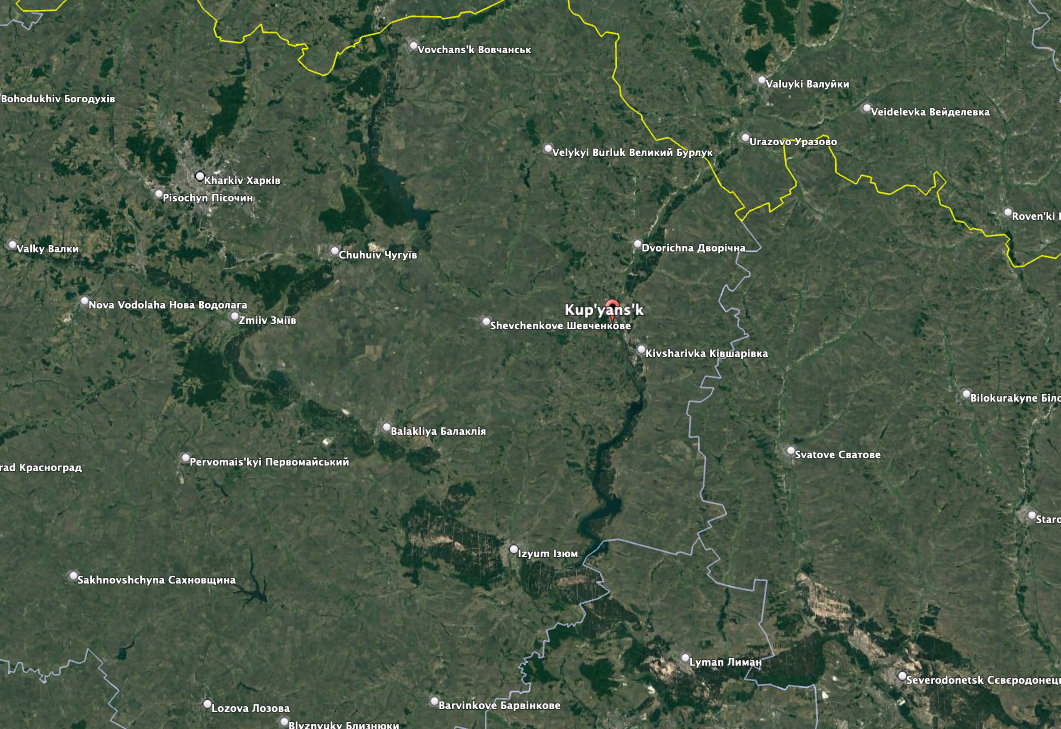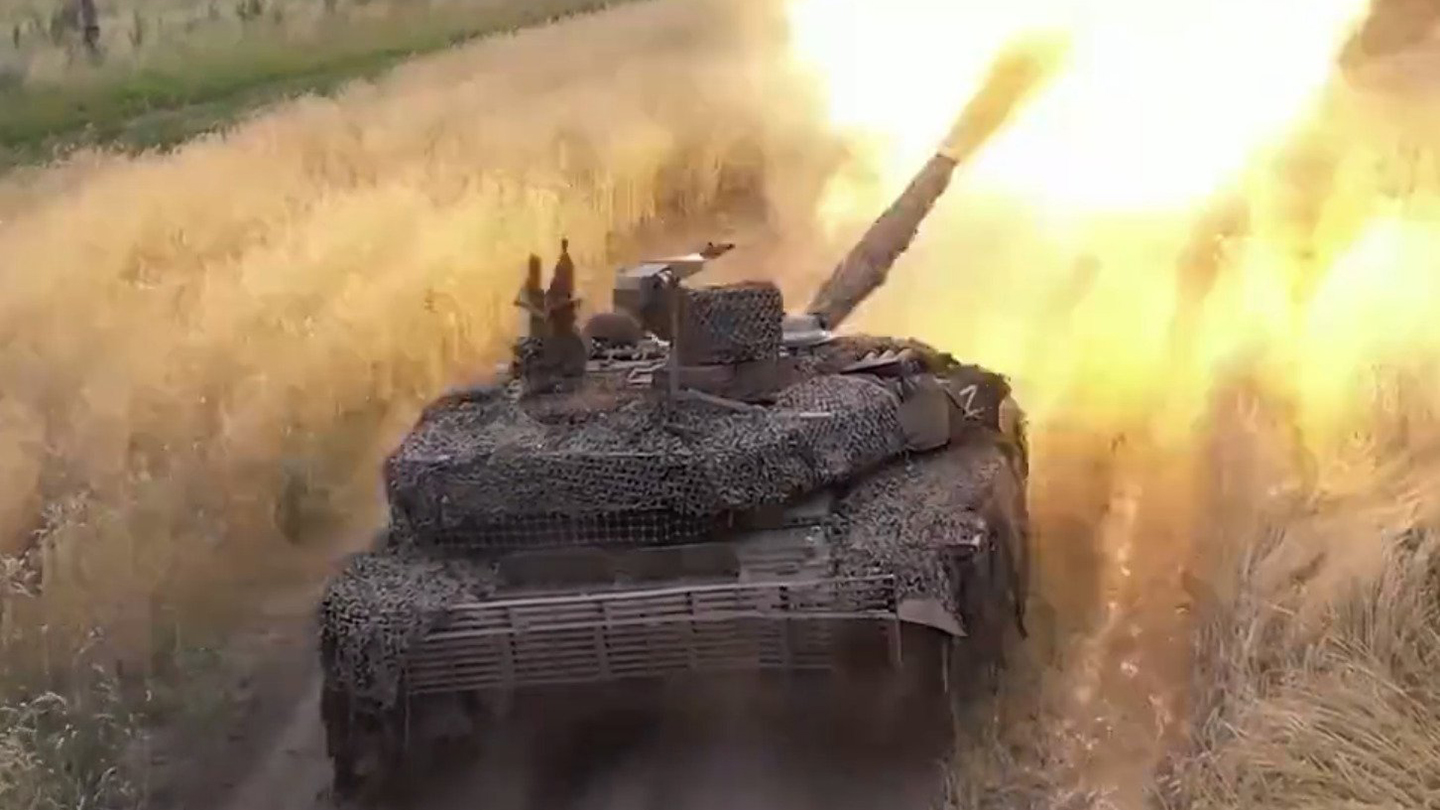Even as it is making slow, incremental progress in its counteroffensive in Zaporizhzhia Oblast and Donbas, Ukraine is finding that it now also has to defend territory it recaptured last Fall.
“The enemy continues to focus its main efforts on the Kupiansk, Lyman, Bakhmut, Avdiivka and Mariansk directions, heavy battles continue,” Ukrainian Deputy Defense Minister Hanna Maliar said Monday on her Telgram channel. “In the Kupiansk direction, the enemy during the week actively conducted assaults with the aim of pushing our units beyond the barrier line of the Oskil River and searched for weak points in our defense. At the moment, the fighting continues, but our defenders are firmly holding their positions.”

In September, Ukraine recaptured all of Kupiansk, crossing over the Oskil River. It was a key moment in its lightning Kharkiv counteroffensive.
The fighting near the Oskil comes a week after Ukrainian military officials claimed that Russia had amassed more than 100,000 troops and 900 tanks in that part of the battlefield.
Maliar’s comments follow a similar assessment by the U.K. Defense Ministry.
“Russia’s Western Group of forces is likely trying to advance back to the Oskil River in order to create a buffer zone around Luhansk Oblast, the possession of which Russia almost certainly considers one of its most fundamental objectives of the war,” the U.K. MoD said in a Tweet on Sunday.
In an effort to defend that part of the front, Ukraine has been using U.S.-donated cluster munitions, according to The Telegraph. (You can read more about them later in this story).
Elsewhere on that part of the front, Russian forces are continuing attacks to clear the Serebryansk Forest, said Maliar. In Bakhmut, she said Ukrainian forces “continue to advance there gradually but confidently. The most brutal battles continue in the area of Klishchiivka, Andriivka, Kurdyumivka.”
The Russian Operation Z Telegram channel on Sunday acknowledged that Ukrainian forces have broken through around Klischiivka.
Meanwhile, as Ukrainian forces push south in Zaporizhzhia Oblast toward Berdiansk and Melitopol, they’ve liberated 12.7 square kilometers this week and nearly 200 square kilometers since the counteroffensive began early last month.
During a press briefing Monday, Matthew Miller, a State Department spokesman said “Ukraine has already regained – if you include Crimea, it’s somewhere around 45 percent of its territory. So, Ukraine has already been incredibly successful in regaining territory that Russia had temporarily occupied.”
Miller would not comment on the status of the counteroffensive, but said “Ukraine has everything it needs to conduct this counteroffensive. We have supplied them with an enormous amount of military equipment, as have our allies and partners both in Europe and around the world, and we will continue to do so.”
And more aid, he said, is on the way.
“You can expect further announcements of military assistance in the coming days,” he said. “We will continue to stand strong with NATO, as it conducts this counteroffensive.”
Whether the Russian push in Kharkiv gains traction and adversely affects Ukraine’s counteroffensive still remains to be seen. But it is worth monitoring closely and we will update this story when warranted.
Before we head into the latest news from Ukraine, The War Zone readers can catch up on our previous rolling coverage here.
The Latest
The President of Romania on Monday strongly condemned a Russian drone strike on a Ukrainian port less than half a mile across the Danube River from his country, a NATO member.
“The recent escalation pose serious risks to the grain security in the Black Sea,” said Klaus Iohannis of the Russian attack on Reni, the latest in a string of airstrike against Ukrainian targets in Odesa Oblast following Moscow’s withdrawal last week from the Black Sea Grain Initiative. That followed a suspected Ukrainian uncrewed surface vessel (USV) attack on the Kerch Bridge, though Russia claims no link.
The Russians attack damaged port infrastructure in Reni, according to Odesa Regional Administrator Oleg Kiper.
“For four hours, the Russians attacked the ports with Shahed-136 drones,” Kiper said Monday on his Telegram channel. As a result six port workers were injured, a hangar with grain was destroyed and cargo storage tanks were damaged, said Kiper.
Meanwhile, it appears that grain shipments have been greatly affected by the Russian airstrikes, with more than four dozen ships waiting to get into port.
Ukrainian sources say they have observed a large movement of Russian troops through Mariupol heading west toward Berdiansk, the Azov Sea port city where Ukrainian troops are pushing slowly south toward.
“At least two convoys of 30 units were recorded during the week from the Novoazovsky direction towards Mangush/Berdyansk,” Petro Andriushchenko, advisor to the Mayor of Mariupol, said Monday on his Telegram channel. The convoy included trucks towing Rapira 100mm anti-tank guns, he said.
Ukrainian officials, he added, are trying to determine whether this represents a direct replacement for troops on the front lines of the fight in Zaporizhzhia Oblast.
China may claim neutrality when it comes to the war in Ukraine, but when it comes to the amount of military aid it provides, the balance is squarely on the side of Russia, according to a story by Politico.
“Russia has imported more than $100 million-worth of drones from China so far this year — 30 times more than Ukraine,” the publication reported. “And Chinese exports of ceramics, a component used in body armor, increased by 69 percent to Russia to more than $225 million, while dropping by 61 percent to Ukraine to a mere $5 million, Chinese and Ukrainian customs data show.”
“What is very clear is that China, for all its claims that it is a neutral actor, is in fact supporting Russia’s positions in this war,” said Helena Legarda, a lead analyst specializing in Chinese defense and foreign policy at the Mercator Institute for China Studies, a Berlin think tank.
Last week, we told you that Poland was moving troops toward its eastern border with Belarus in reaction to the arrival of Wagner Private Military Company troops in the Russian vassal state.
Today, video emerged on social media showing a convoy of Polish armored vehicles heading to the border.
The Gepard self-propelled anti-aircraft gun has proven a great help to Ukrainian air defense units. But keeping its 35mm guns fed with ammunition has proven challenging. The German publication Bild recently wrote about the explanation provided by Rheinmetall, Germany’s largest arms maker.
Rheinmetall came up with a work-around to adapt existing ammunition that is easier to source to work in the Gepards using their existing fire control systems. How exactly this was done isn’t clear, but it should be a big win for Ukraine’s growing fleet of the guided anti-aircraft guns.
Now Rheinmetall said it will deliver 300,000 rounds to Ukraine, with 40,000 set to arrive by the end of the year.
Last week, The Independent reported Ukraine has already received several dozen systems wedding Brimstone anti-armor missiles to a rugged tactical truck. Developed under Project Wolfram, this system combines a high-mobility 6×6 Supacat HMT 600 chassis with an eight-round launcher for Brimstones, which until the war in Ukraine had only been fired from aircraft and boats. The Supacat company calls the resulting weapons system the Brimstone HMT Overwatch.
Images of Ukraine using ground-launched Brimstones fired from improvised launchers installed on the back of trucks began to emerge back in May of 2022. This was far from an ideal arrangement, but it got the missiles into action as fast as possible. You can read more about that in our story here. Now it appears a far more capable platform will be a host for the missiles which could prove very useful in Ukraine’s counteroffensive.
The Ukrainian military last week announced the U.S.-donated cluster munitions had been used on the battlefield.
Today, the first photo of the Dual-Purpose Improved Conventional Munitions (DPICMs) – 155mm artillery munitions containing individual submunitions, or bomblets – emerged on social media. You can read more about these munitions, what they can do, why they are controversial and Ukraine’s efforts to mitigate the dangers in our story here.
Two Ukrainian Leopard 2A6 main battle tanks were reportedly struck by Russian Krasnopol laser-guided artillery shells then First Person Video (FPV) drones. It is unclear from this video below the extent of the damage.
Speaking of damaged Leopard 2 tanks, Germany has reached an agreement with Poland on setting up a facility to repair those German-made tanks damaged at the front in Ukraine.
“We welcome that now also Ukrainian Leopard 2A4 tanks can be repaired in Poland,” Mitko Müller,spokesman of the Federal Ministry of Defense, said at a briefing in Berlin, accorfding to the official Ukrainian Ukrinform news outlet.
The following video is yet another example of the horrors of trench combat, where combatants are often just a short distance away. In this case, Russian and Ukrainian troops apparently surprised each other, a firefight broke out and the Ukrainians apparently fell back.
A Ukrainian drone crew was exceedingly lucky recently when a German-donated Bergepanzer 3 ARV “Büffel” recovery vehicle got between them and a Russian anti-tank guided missile (ATGM). While the drone crew survived, it is unclear from this video what happened to the Büffel’s crew or the vehicle itself.
Ukraine as well is continuing to use ATGMs to great effect, as you can see in this video below.
In this photo below, which has no date or location, a Ukrainian soldier is seen putting out a fire on one of Ukraine’s few Tor surface-to-air (SAM) missile systems, reportedly hit by a Russian Lancet drone.
Wreckage of an unexploded AeroVironment Switchblade 600 armor-busting kamikaze drone donated to Ukraine was found somewhere in Donetsk.
More than a year of war has left much of Ukraine in ruins.
The Kyiv Post shared drone images of the village of Kamianka in Kharkiv Oblast that shows the town largely obliterated.
We’ve told you in the past about the postage stamp Ukraine released depicting the infamous invective uttered by Ukrainian Border Guards responding to a demand from the crew of the Moskva to surrender on Snake Island with the defiant retort “Russian warship, go fuck yourself!”
Well, it turns out that it won grad prize from the Asiago International Awards For Philatelic Art, according to the official Ukrainian Ukrinform news agency, citing the Ukrainian Ukrposhta press service.
And finally, the Barbie craze seems to have caught on in Kyiv.
That’s it for now. We’ll update this story when there’s more news to report about Ukraine.
Contact the author: howard@thewarzone.com
